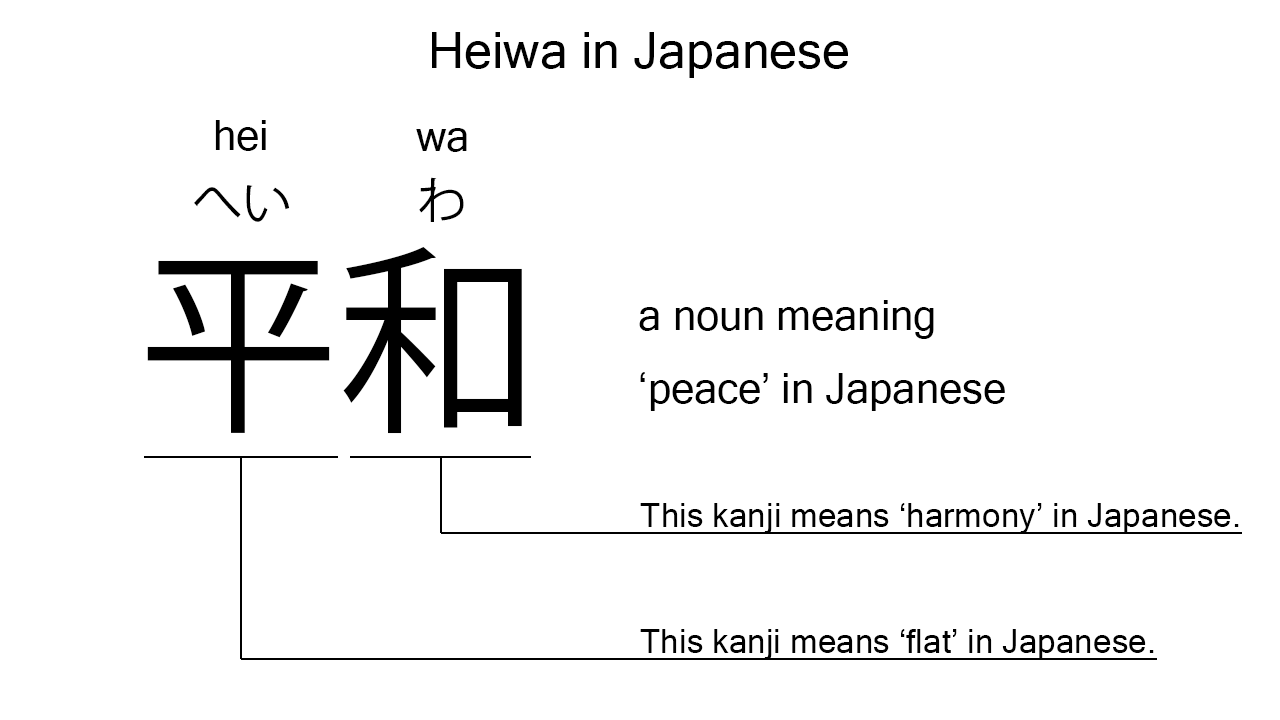What does “heiwa” mean in Japanese?
Native speakers use heiwa to mean ‘peace’ in Japanese. Perhaps, some Japanese learners know this word as it is sometimes used in Japanese movies, songs, novels, manga, anime, and the like. In this blog post, however, I’m explaining this word in detail based on its kanji expression. And also, I’m explaining how to use it through example sentences. My explanations would help Japanese learners understand heiwa more clearly. Then, let’s get started!
Contents
Definition and meaning of “heiwa”
Let me start with the definition and meaning of heiwa.
- heiwa – 平和 (へいわ) : a noun meaning ‘peace’ in Japanese.
Native speakers use this noun to refer to a calm situation where nobody is threatened. So, its usage is similar to that of the English noun, peace, I think.
The definition and meaning are simple and clear. To understand this noun more clearly, however, let me explain its kanji characters in detail, one by one.
Japanese kanji for peace
The Japanese kanji expression for peace consists of the following two kanji characters:
- 平 : a kanji character often used to describe something flat, plain, or broad. This kanji can also be found in other words like heiki.
- 和 : a kanji character often used to describe something harmonized.
From these two kanji characters, we can understand that heiwa literally means something flat and harmonized in Japanese. This literal interpretation is not completely in line with the actual meaning, but still understandable, I think. In Japanese, peace – the situation where nobody is threatened – can be considered as something flat and harmonized.

When we meet new kanji expressions, we should check their kanji characters in detail to understand their meanings clearly and deeply. In many cases, kanji characters tell us a lot about the meanings of the expressions they form. Actually, here, we could get the better understanding of heiwa through the detailed kanji check above.
So far, I’ve explained the definition and meaning of heiwa together with its kanji characters. Then, let me explain how to use it through the example sentences below.
How to say “peace” in Japanese
boku wa sekai no heiwa wo negau – 僕は世界の平和を願う (ぼくはせかいのへいわをねがう)
I hope for peace in the world.
Below are the new words used in the example sentence.
- boku – 僕 (ぼく) : a pronoun meaning ‘I’ in Japanese. This is used mainly by boys and young males.
- wa – は : a binding particle working as a case marker or topic marker. In the example, this works after boku to make the subject in the sentence.
- sekai – 世界 (せかい) : a noun meaning ‘the world’ in Japanese.
- no – の : a case particle used to join two nouns. Normally, the first one can work as a modifier to describe the second. In the example, this is used to join sekai and heiwa. The formed phrase literally means ‘world peace’ in Japanese. It has been translated as ‘peace in the world’, though.
- wo – を : a case particle used to make the object word in a sentence. In the example, this is used after sekai no heiwa to make the object in the sentence.
- negau – 願う (ねがう) : a verb meaning ‘to hope’, ‘to wish’, or ‘to pray’ in Japanese.
This is a typical usage of heiwa. In this example, it works as a part of the commonly-used phrase, sekai no heiwa, which means ‘peace in the world’ in Japanese. When we want to mean ‘peace’ in Japanese, anyway, this noun is always a very good option.
Another example of “heiwa”
watashi tachi no mokuhyou wa chikyuu no heiwa desu – 私達の目標は地球の平和です (わたしたちのもくひょうはちきゅうのへいわです)
Our goal is the peace on Earth.
Below are the new words used in the example sentence.
- watashi – 私 (わたし) : a pronoun meaning ‘I’ in Japanese.
- tachi – 達 (たち) : a suffix used after a noun or pronoun to make its plural form. In the example, this is used after watashi to make its plural form, watashi tachi, which means ‘we’ in Japanese. Learn more about Japanese plural.
- no – の : a case particle used after a noun or pronoun to make its possessive case. In the example, this is used after watashi tachi to make its possessive case, watashi tachi no, which means ‘our’ in Japanese.
- mokuhyou – 目標 (もくひょう) : a noun meaning a ‘goal’ in Japanese. This can also work as plural.
- chikyuu – 地球 (ちきゅう) : a noun meaning ‘the Earth’ in Japanese.
- desu – です : an auxiliary verb used after a noun or adjective to make it polite. Probably, this is well known as a part of Japanese desu form. In the example, this is used after chikyuu no heiwa to make it sound polite.
This is another example of heiwa. In this example, it works as a part of the noun phrase, chikyuu no heiwa, which literally means ‘the peace on Earth’ in Japanese.
Summary
In this blog post, I’ve explained the definition and meaning of heiwa in detail together with the Japanese kanji expression for peace. And also, I’ve explained how to use it through the example sentences. Let me summarize them as follows.
- heiwa – 平和 (へいわ) : a noun meaning ‘peace’ in Japanese. Native speakers use this noun to refer to a very calm situation where nobody is threatened. So, the usage of this noun is similar to that of the English one, peace, I think. These two kanji characters literally mean something flat and harmonized. This means that in Japanese peace – the situation where nobody is threatened – can be considered as something flat and harmonized.
Hope my explanations are understandable and helpful for Japanese learners.
Leave a Reply